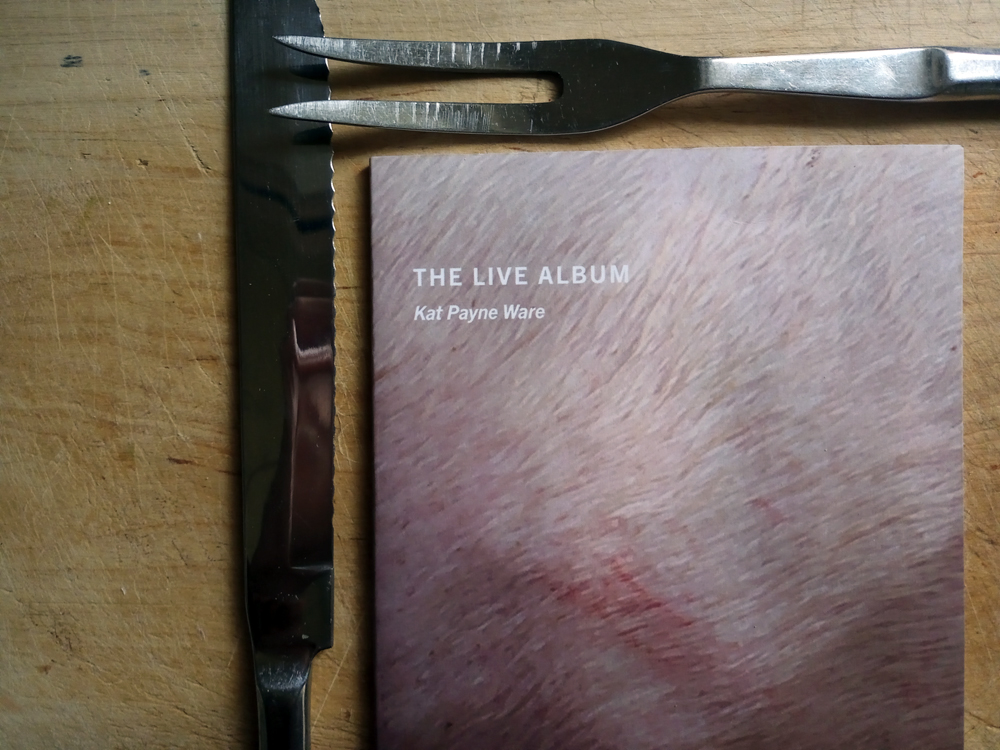
Few collections I’ve read provide – or even attempt – a more satisfying marriage of form and content than THE LIVE ALBUM. Its presiding subject is meat, and in particular meat production and consumption – the queasy horror of flesh being cleaved and compacted, over and over, by rigid, cold machinery. Language, like muscle, is ever on the slide, stretching out and gathering itself, knitting and unknitting, so it makes sense that here the language is chunked off and portioned out in unsettling, sharp patterns.
There’s an overall structure to the pamphlet that is reminiscent of any chillingly practical chopping-and-sorting mechanism: the poems of the first half personify pork cuts, taking each in turn, while the poems in the second half run backwards through the meat production process, from ‘CURING’ through to ‘TRANSPORTATION’. Individual poems also wear their forms conspicuously, in such a way as to trouble, if not outright deny, any naturalistic reading; ‘RIBS’ is a sestina, making a virtue of that form’s tendency to sound increasingly forced. ‘FINNING’ is heavily footnoted, the footnotes operating as a second, separate ‘overflow’ poem. ‘EVISCERATION’ is severed down its centre, the gap filled by a block comprising repetitions of the word ‘NOTHING’. In this way, language is bent and brutalised so as to evoke the destruction of animals’ bodies.
In terms of voice, Payne Ware switches between a number of different registers, from formal instruction (“Automatically process each carcass by the individual / length. Printing of a health mark is possible.”) to lyrical and imagistic (“I spin my red wool / in the purificatory rite / of a spider dropping / stitches onto steel / altars”). ‘CHEEK’ reads as a pastiche of a desire poem (“I fall apart at the touch / of a fork. Tenderise / me, treat me like a bad / good dog.”) while ‘STUNNING’ plays with the epistolary mode (“Dear Benjamin, you must have known / I longed to see the stars.”). It’s a familiar effect – the strange mixture of tones, the contrast of delicacy and bluntness, the sense, sometimes, of fragments bolted on to one another with a staple gun – but each part is skilfully balanced. The poems work individually, and chain together coherently (or rather, so far as there is incoherence, I took it as all part of the show).
I found myself wondering if, overall, the collection operates as a protest against the meat industry, or if it means to. For me, TLA actually mitigates the degree to which I’m revulsed by the industrial killing of animals. I remember, as a teenage vegetarian, encountering Morrissey’s deliciously mournful line “It’s sizzling blood and the unholy stench of murder” and it somehow making meat seem enticing. Similarly, the formal play and ingenuity of TLA is arresting in a way that leads me toward an aesthetic appreciation of the processes illuminated. The problem is that I love seeing this done to language – I love to see it shaped, worried, treated as physical matter – so the language-as-meat metaphor works backwards to make me soften, if only slightly, my stance on factory farming. I have to pull myself away from the spell of the poetry in order to reconvene my objections. After all, the pork cuts in the first half are having a really sensuous time of it!
But this is just an observation. At no point is TLA didactic about its politics, and I expect that the impact would be different on someone who does not begin from a position of disquietude. Conceptions of savoury tenderness attached to both cooked pork and the contemporary lyric are swept away; the poetry here is tough, rather bloody and steely, and does not always go down easy.